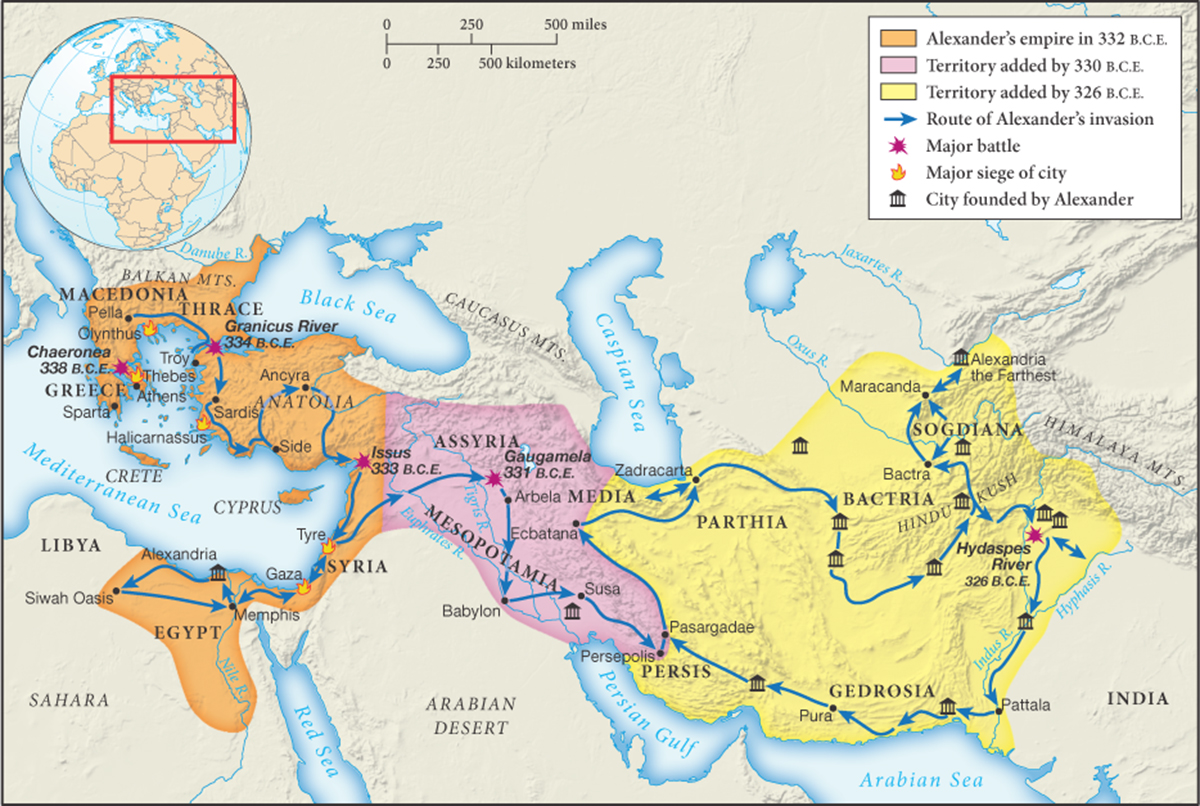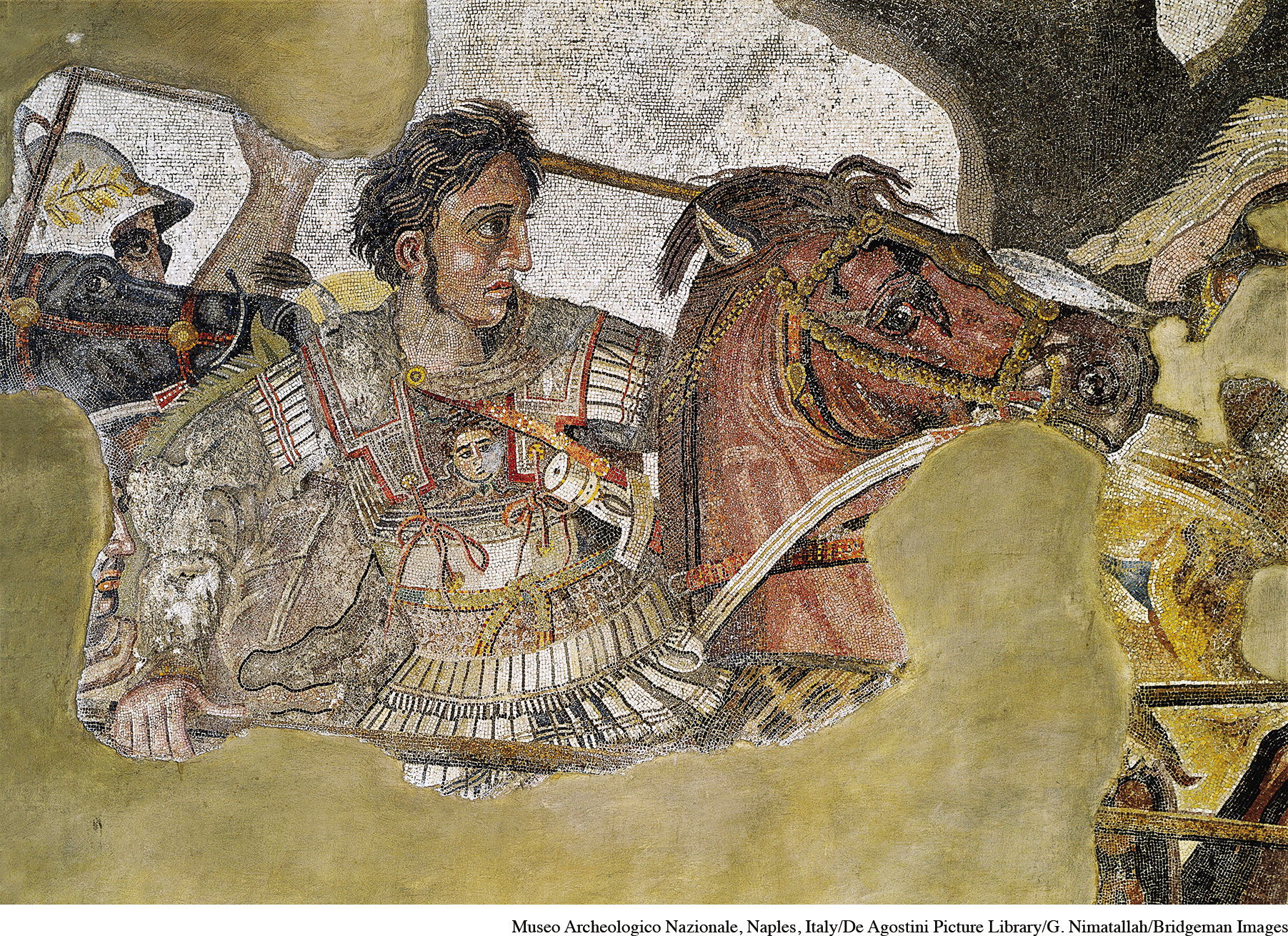Collision: Alexander and the Hellenistic Era
The Macedonian takeover of Greece, led by its king, Philip II, finally accomplished by 338 B.C.E. what the Greeks themselves had been unable to achieve—the political unification of Greece, but at the cost of much of the prized independence of its various city-states. It also set in motion a second round in the collision of Greece and Persia as Philip’s son, Alexander, prepared to lead a massive Greek expedition against the Persian Empire. Such a project appealed to those who sought vengeance for the earlier Persian assault on Greece, but it also served to unify the fractious Greeks in a war against their common enemy.
What changes did Alexander’s conquests bring in their wake?
The story of this ten-year expedition (333–323 B.C.E.), accomplished while Alexander was still in his twenties, has become the stuff of legend (see Map 3.3). Surely it was among the greatest military feats of the ancient world in that it created a Greek empire from Egypt and Anatolia in the west to Afghanistan and India in the east. In the process, the great Persian Empire was thoroughly defeated; its capital, Persepolis (per-SEP-uh-lis), was looted and burned; and Alexander was hailed as the “king of Asia.” In Egypt, Alexander, then just twenty-four years old, was celebrated as a liberator from Persian domination, was anointed as pharaoh, and was declared by Egyptian priests to be the “son of the gods.” Arrian, a later Greek historian, described Alexander in this way:

Map 3.3 Alexander’s Empire and Successor States Alexander’s conquests, though enormous, did not long remain within a single empire, for his generals divided them into three successor states shortly after his death. This was the Hellenistic world within which Greek culture spread.
His passion was for glory only, and in that he was insatiable…. Noble indeed was his power of inspiring his men, of filling them with confidence, and in the moment of danger, of sweeping away their fear by the spectacle of his own fearlessness.8

Alexander the Great This mosaic of Alexander on horseback comes from the Roman city of Pompeii. It depicts the Battle of Issus (333 B.C.E.), in which Greek forces, although considerably outnumbered, defeated the Persian army, led personally by Emperor Darius III. (Museo Archeologico Nazionale, Naples, Italy/De Agostini Picture Library/G. Nimatallah/Bridgeman Images)
Alexander died in 323 B.C.E., without returning to Greece, and his empire was soon divided into three kingdoms, ruled by leading Macedonian generals.
From the viewpoint of world history, the chief significance of Alexander’s amazing conquests lay in the widespread dissemination of Greek culture during what historians call the Hellenistic era (323–30 B.C.E.). Elements of that culture, generated in a small and remote Mediterranean peninsula, now penetrated the lands of the First Civilizations—Egypt, Mesopotamia, and India—resulting in one of the great cultural encounters of the ancient world.
The major avenue for the spread of Greek culture lay in the many cities that Alexander and later Hellenistic rulers established throughout the empire. Complete with Greek monuments, sculptures, theaters, markets, councils, and assemblies, these cities attracted many thousands of Greek settlers serving as state officials, soldiers, or traders. Alexandria in Egypt—the largest of these cities, with half a million people—was an enormous cosmopolitan center where Egyptians, Greeks, Jews, Babylonians, Syrians, Persians, and many others rubbed elbows. A harbor with space for 1,200 ships facilitated long-distance commerce. Greek learning flourished thanks to a library of some 700,000 volumes and the Museum, which sponsored scholars and writers of all kinds.
From cities such as these, Greek culture spread. From the Mediterranean to India, Greek became the language of power and elite culture. The Indian monarch Ashoka published some of his decrees in Greek, while an independent Greek state was established in Bactria in what is now northern Afghanistan. The attraction of many young Jews to Greek culture prompted the Pharisees to develop their own school system, as this highly conservative Jewish sect feared for the very survival of Judaism. (See Zooming In: The Kushan Empire, for Greek influence on this Central Asian kingdom.)
Cities such as Alexandria were very different from the original city-states of Greece, both in their cultural diversity and in the absence of the independence so valued by Athens and Sparta. Now they were part of large conquest states ruled by Greeks: the Ptolemaic (TOL-uh-MAY-ik) empire in Egypt and the Seleucid empire in Persia. These were imperial states, which, in their determination to preserve order, raise taxes, and maintain the authority of the monarch, resembled the much older empires of Mesopotamia, Egypt, Assyria, and Persia. Macedonians and Greeks, representing perhaps 10 percent of the population in these Hellenistic kingdoms, were clearly the elite and sought to keep themselves separate from non-Greeks. In Egypt, different legal systems for Greeks and native Egyptians maintained this separation. An Egyptian agricultural worker complained that because he was an Egyptian, his supervisors despised him and refused to pay him.9 Periodic bellions expressed resentment at Greek arrogance, condescension, and exploitation. But the separation between the Greeks and native populations was by no means complete, and a fair amount of cultural interaction and blending occurred. Alexander himself had taken several Persian princesses as his wives and actively encouraged intermarriage between his troops and Asian women. In both Egypt and Mesopotamia, Greek rulers patronized the building of temples to local gods and actively supported their priests. A growing number of native peoples were able to become Greek citizens by obtaining a Greek education, speaking the language, dressing appropriately, and assuming Greek names. In India, Greeks were assimilated into the hierarchy of the caste system as members of the Kshatriya (warrior) caste, while in Bactria a substantial number of Greeks converted to Buddhism, including one of their kings, Menander. A school of Buddhist art that emerged in the early centuries of the Common Era depicted the Buddha in human form for the first time, but in Greek-like garb with a face resembling the god Apollo. (See Working with Evidence, Source 4.2.) Clearly, not all was conflict between the Greeks and the peoples of the East.
In the long run, much of this Greek cultural influence faded as the Hellenistic kingdoms that had promoted it weakened and vanished by the first century B.C.E. While it lasted, however, it represented a remarkable cultural encounter, born of the collision of two empires and two second-wave civilizations. In the western part of that Hellenistic world, Greek rule was replaced by that of the Romans, whose empire, like Alexander’s, also served as a vehicle for the continued spread of Greek culture and ideas.

